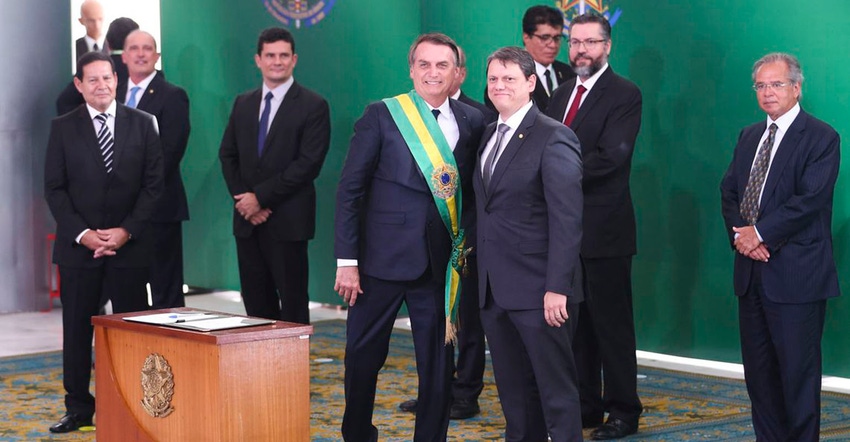
I’ve never seen such economic optimism among Brazilians—even after the 1994 real (currency) plan that killed hyperinflation and put an end to the revolving door of monthly price indices and the issuing of new currencies.
This optimism, for those who aren’t native Brazilians, comes from the new Bolsonaro presidency, inaugurated at the first of the year.
As Brazilian farmer-leader Lucas Costa Beber told me last week, most producers are optimistic about changes the new Brazilian administration is set to put into place. In a sign of the belief Bolsonaro will turn things around, Brazil’s real currency has gained 5% on the U.S. dollar since October 1, prior to the presidential election.
I asked Beber where all the optimism came from, and he listed the top three issues he said farmers reckoned a Bolsonaro administration would address right away. You can see from last week’s blog, he stressed streamlining the bureaucracy by folding some of Brazil’s Kafkaesque ministries and secretariats into the Ministry of Agriculture and quicker approvals of new molecules for crop protection products. He talked quite a bit about personal security on the farm and swift justice for the “bandits” who steal entire sheds of inputs for quick resale.
Number one on the list
The first thing he hit on was infrastructure. Perhaps nothing on Beber’s wish list would do more to make Brazilian farmers more competitive with American farmers. Infrastructure improvements, including an end to “the recently published official freight cost table established in June by the previous administration to put an end to a crippling truckers’ strike as well as infrastructure improvements for transporting grain.”
After all, as we head into Brazilian harvest, it costs around $64.50 to haul a tonne of beans from Sorriso, in northern Mato Grosso to the Paranagua Port. Producers would like to see that cost come down.
Infrastructure and agriculture hand in hand
Last week President Bolsonaro, who wants to privatize a laundry list of government-owned or controlled companies like state oil giant Petrobras, made farmers smile when he confirmed his commitment to privatization, particularly his support for 30-year concessions to private industry to build and maintain roads, waterways and railways.
“Continuity is important,” he said. “in order to continue to transfer ownership shares (of transport infrastructure) to private industry…”
An auction for the North-South Railway (from track in Brasilia all the way North to an Atlantic Ocean port near the mouth of the Amazon) is set to take place by month’s end.
At the same time, Brazil’s new Transportation Ministry also plans to sell multi-year concessions this year to improve and maintain at least seven federal highways.
Coordination
But it’s not just a long list of infrastructure privatizations that is delivering the newfound optimism to Brazilian agriculture in 2019. A far less measurable, but equally important, factor seems to be at play as well. A new sense of teamwork among the streamlined federal ministries and secretariats appears to be taking hold, as evidenced by what newly-minted Infrastructure Minister Tarcisio Gomes de Freitas said when he took office. Ag Minister Tereza Cristina was present. “Infrastructure (improvements,)” he said, will be very important to Tereza (Cristina’s) agribusiness, and we’ll work together a lot, you can be sure of that, Minister.”
Gomes de Freitas even picked out finishing paving work on the famously muddy truck trap federal highway BR-163, which goes from Mato Grosso to Amazon ports, as his first example. “The federal roadway infrastructure department... will ensure the transportation of commodities from Mato Grosso to (northern Brazilian ports.)”
The minister also cited further work on railways and waterways.
To the extent that the ministries of transportation and agriculture work together to address these issues, they will not only put a smile on the face of farmers like Beber—they will address Brazil’s agricultural Achilles’ Heel.
No wonder that, after years of red tape and creaking infrastructure, Brazilian farmers say things may be looking up in 2019.
About the Author(s)
You May Also Like






